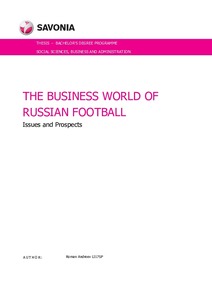The Business World of Russian Football : Issues and Prospects
Andreev, Roman (2020)
Andreev, Roman
2020
All rights reserved. This publication is copyrighted. You may download, display and print it for Your own personal use. Commercial use is prohibited.
Julkaisun pysyvä osoite on
https://urn.fi/URN:NBN:fi:amk-2020121628713
https://urn.fi/URN:NBN:fi:amk-2020121628713
Tiivistelmä
Beyond any doubt, football, known as soccer in North America, remains to be one of the most influential sport games in the history of humanity. Up to this day, soccer continues to captivate billions of sports enthusiasts all over the globe. Football has achieved great recognition, and it is now considered the most popular sport in the world. Nowadays it is appropriate and entirely justified to talk about the emergence of the football industry. Basically, modern soccer can be viewed as an international business, since global player transfers are made on a regular basis and international professional tournaments are organized. Moreover, soccer leagues may be now rightfully classified as separate commercialized industries.
Certain football tournaments perform much better than their competitors in a business sense. In this work, the Russian Premier League in particular is discussed. The aim of the study is to investigate the historic and current issues of Russian soccer, the reasons for their emergence, and the present state. Furthermore, the commercial prospects and possibilities for local football’s business development are inspected. Potential solutions to the outlined problems are demonstrated as well. Finally, the investment climate for the clubs and the league as a whole is briefly examined. The research is based on secondary data collected from public sources. Specifically, sport articles, scientific papers, journals, interviews, databases and financial statements are used. Overall, the thesis is set up on the grounds of profound desk research.
It is concluded that in Russia, the national championship is far from profitable. Local soccer is plagued with specific issues that have hindered its economic development for a considerable time. The appearance of emblematic problems can be traced to the Soviet times. Among the existing problems, the most striking one is the weight of government ownership and general political interference in Russian football. In addition, there is an issue of incompetent management of the league and questionable decision-making process. The income gained from the sale of broadcasting rights is also unacceptable for the sixth most powerful European league. Eventually, it is stated that whilst the actual business position of Russian football is extremely troubling, there is undeniably an open room for growth. Despite all the issues, a clear path for improvement can be seen, but the government and soccer organizations must take decisive actions to save the situation urgently.
Certain football tournaments perform much better than their competitors in a business sense. In this work, the Russian Premier League in particular is discussed. The aim of the study is to investigate the historic and current issues of Russian soccer, the reasons for their emergence, and the present state. Furthermore, the commercial prospects and possibilities for local football’s business development are inspected. Potential solutions to the outlined problems are demonstrated as well. Finally, the investment climate for the clubs and the league as a whole is briefly examined. The research is based on secondary data collected from public sources. Specifically, sport articles, scientific papers, journals, interviews, databases and financial statements are used. Overall, the thesis is set up on the grounds of profound desk research.
It is concluded that in Russia, the national championship is far from profitable. Local soccer is plagued with specific issues that have hindered its economic development for a considerable time. The appearance of emblematic problems can be traced to the Soviet times. Among the existing problems, the most striking one is the weight of government ownership and general political interference in Russian football. In addition, there is an issue of incompetent management of the league and questionable decision-making process. The income gained from the sale of broadcasting rights is also unacceptable for the sixth most powerful European league. Eventually, it is stated that whilst the actual business position of Russian football is extremely troubling, there is undeniably an open room for growth. Despite all the issues, a clear path for improvement can be seen, but the government and soccer organizations must take decisive actions to save the situation urgently.
